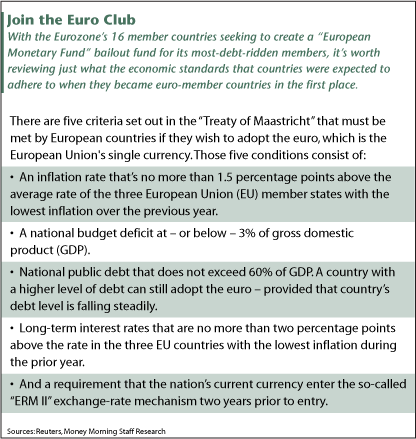Question: Shah, your article on capital-wave investing was outstanding. In fact, I would love to see a follow-up piece for those of us who are not traders and who are not out and about following the current short-term market trends.
For example, when you talk about the Obama administration's determination to keep interest rates low - this has consequences. What will those rates be in, say, a three-year to five-year time frame? What if the European countries keep having implosions like Greece - meaning that countries like Portugal, Spain and Italy follow suit?

In your opinion, will that eventually sink the euro, or does the Eurozone have to bail out those countries with a plan that's similar to the one that it is developing for Greece? What happens to other currencies in either of these scenarios?
Finally, is it your opinion that China is trying to curtail its growth to keep itself from overheating? Can Beijing successfully continue to do this - or will this blow up in China's face? If you look down the road, say, three to five years, what do you believe the consequences, if any, will be?
Again, Shah, this was a really informative article. I would love to hear your views on what you actually see playing out in each of these areas during the next few years.
Answer: Thank you for your kind words about the article and for taking the time to pose your questions - which are excellent ones, by the way. Let's take a look at them, one at a time...
Handicapping the Consequences of the Financial Crisis
I believe that your overriding question was this one: What are the three- to five-year consequences of what's going on today? Well, the short answer is this: Because of the powerful impact that "capital waves" can have on financial markets all around the world, a period of three years to five years is too long of a time horizon to consider when it comes to your money.
Precisely because the world is increasingly interconnected in terms of global trade and the huge capital flows chasing "yield" - one of the key "capital waves" that I'm currently watching - everything is happening faster than ever before. Don't get me wrong: It's still important to have a long-term view of things; but it's more important to not get stuck with souring positions when in the blink of an eye your investments can be obliterated.
Understanding what's just over the horizon helps us pilot our money more prudently on the way to "there." Just don't forget, "there" is all about making money. Ride your winners and cut your losses, but take profits along the way.
The Interest in Interest Rates
The interest-rate situation is a fascinating one. Right now, rates must be kept low to give the economy a chance to heal and to create job growth. At some point, the market will react if it sees serious signs of inflation and rates will start to rise. A look at the big picture tells us that we must weigh the likelihood of slow - or no - job growth (that's why they call it a "jobless recovery") and constrained consumer demand predicated by curtailed credit, against rising government debt and the eventual "crowding out" that will cause rates to rise when hoped-for growth prospects actually materialize. This is the equation to watch in the near term.
Now if we look three to five years out, I expect higher rates to be structurally embedded in the economy until the United States finds a way to significantly pare its debt load. Of course, that can be changed by the stroke of a pen if we get a balanced-budget amendment. But the near-term chance of that happening resides at the midway point between "slim" and "none."
When an Economy Sours, the Currency is Sure to Follow
Turning, next, to what's happening in Europe, here's the big picture - but be mindful it can change. The European Union (EU) is technically prohibited from bailing out countries that are party to the treaty (including the "Maastricht Criteria") that binds the Union. Each member nation is supposed to cap its deficit at 3% of its gross domestic product (GDP) (See accompanying graphic).

Obviously, several countries are way beyond that. European countries can "bilaterally" help or bail out any of their neighbors. Or, they can work together to do that - which is technically a contravention of the intent of the treaty. As we well know, however, when the pressure reaches its greatest point, sometimes the rulebook goes right out the window.
Sure, there are calls for the EU's leadership to "throw the bums (Greece) out of the Union." But the truth is that several Eurozone members are now lined up like dominos: If Greece falls, they could, too.
Here's the reality: If the European Union is to be saved, they have to save the euro. The euro is the reason for the Union. I expect there to be aid to the problem countries to save the euro. But as sure as long-term problems persist - and they will - the euro will eventually fall in value. I expect to see it at parity with the dollar. Not that the dollar isn't going to fall, eventually it will. But the euro will fall further - and faster. At some equilibrium point (there always is one), this situation will settle down and a new horizon will appear.
China: Long Term All Systems Are "Go"
China remains a fascinating story... as stories go, it's actually a "must read" for capital-wave investors. The Asian giant can slow its growth, but that's always a delicate balancing act. If Beijing raises rates too much - or curtails credit too quickly - asset prices might fall precipitously. That could result in a panic. Given that we here in the United States are still suffering through the consequences of our own recent financial panic, we understand how devastating that can be.
China is no exception to any economic rules. But there are lots and lots of rules... you really need to know which ones apply at any given time. And that requires the kind of context that a capital-wave-investing analysis can provide.
That context is particularly crucial if we're to answer your question about the three- to five-year outlook for China. And here's why: My long view on China - your "three-to-five-year" question - is that China is today where the United State was in the late 1950s . The China rocket has lifted off, but we've only seen the first stage fired. China's rocketship has several more stages - as well as plenty of fuel - and mission control in Beijing has crafted a flight plan that calls for this rocket to circle the world and keep circling it until China is the one world superpower.
That's a capital wave investors can't afford to ignore.
[Editor's Note: As the response to his "capital-wave-investing" essay underscores, Money Morning Contributing Editor R. Shah Gilani always has something to say. So it's no surprise that his columns and analyses have been read by millions.
A retired hedge-fund manager and gifted analyst, Gilani has literally seen it all on the world of finance. That enables him to take readers behind Wall Street's "velvet rope" - and into the world he knows so well - exposing the pitfalls that can inoculate investors against ruinous losses even as he highlights profit opportunities that most other experts never even recognize.
With his new advisory service - The Capital Wave Forecast - Gilani shows investors the monster "capital waves" now forming, will demonstrate how to profit from every one, and will make sure to highlight the market pitfalls that all too often sweep investors away.
Take a moment to check out Gilani's capital-wave-investing strategy - as well as the profit opportunities that he's watching as a result. And, like the reader above, please feel free to submit questions, comments and contributions to the "Money Morning Mailbag" feature to [email protected]. Then watch Money Morning each week for readers' letters and our published responses.]
News and Related Story Links:
- Money Morning Special Report:
How Capital Waves Are Creating the Biggest Profit Opportunities in Today's Markets - Money Morning Special Report:
Capital Wave Investing: Is it Time to Profit From the Cash-Rich Technology Sector? - The Capital Wave Forecast:
Official Web Site - Money Morning News Archives:
Capital Waves - Money Morning Mailbag Feature:
Money Morning Mailbag: How the Demise of Glass-Steagall Helped Spawn the Credit Crisis - Wikipedia:
Eurozone - Money Morning Market Commentary:
Beware of Eurozone Plans for Greek Debt Bailout - Money Morning Market Commentary:
European Bailout Fund Proposal ... Just Another Bad Idea - Wikipedia:
Euro Convergence Criteria/Mastricht Criteria
About the Author
Shah Gilani boasts a financial pedigree unlike any other. He ran his first hedge fund in 1982 from his seat on the floor of the Chicago Board of Options Exchange. When options on the Standard & Poor's 100 began trading on March 11, 1983, Shah worked in "the pit" as a market maker.
The work he did laid the foundation for what would later become the VIX - to this day one of the most widely used indicators worldwide. After leaving Chicago to run the futures and options division of the British banking giant Lloyd's TSB, Shah moved up to Roosevelt & Cross Inc., an old-line New York boutique firm. There he originated and ran a packaged fixed-income trading desk, and established that company's "listed" and OTC trading desks.
Shah founded a second hedge fund in 1999, which he ran until 2003.
Shah's vast network of contacts includes the biggest players on Wall Street and in international finance. These contacts give him the real story - when others only get what the investment banks want them to see.
Today, as editor of Hyperdrive Portfolio, Shah presents his legion of subscribers with massive profit opportunities that result from paradigm shifts in the way we work, play, and live.
Shah is a frequent guest on CNBC, Forbes, and MarketWatch, and you can catch him every week on Fox Business's Varney & Co.



